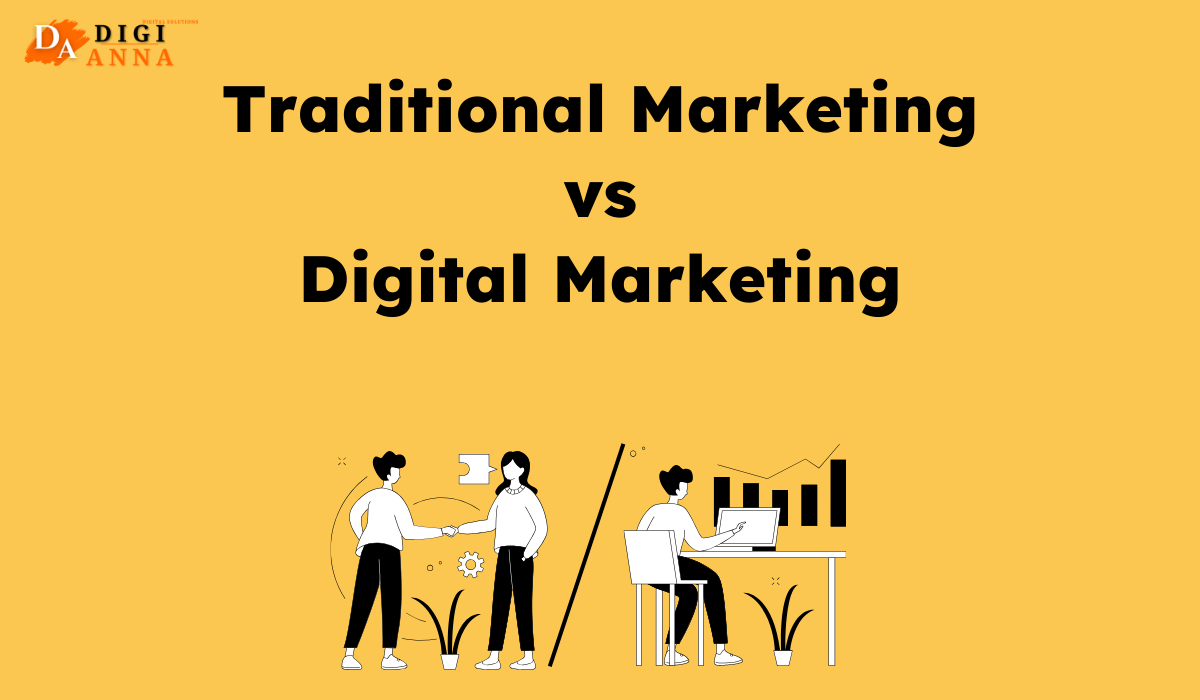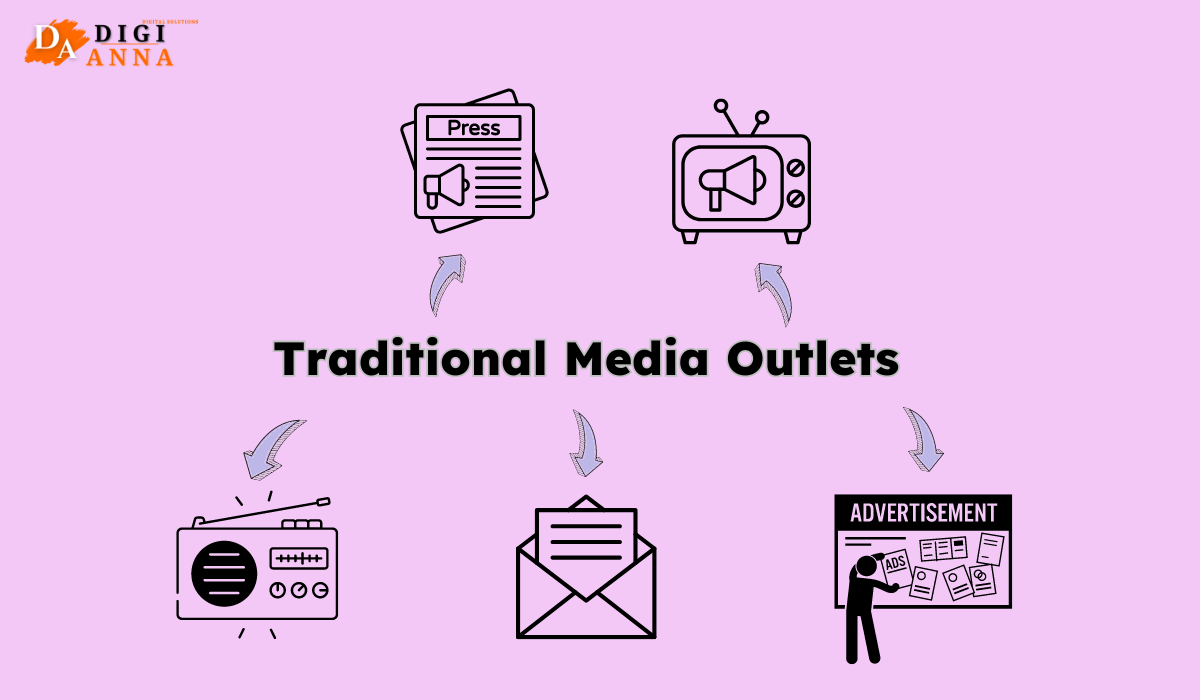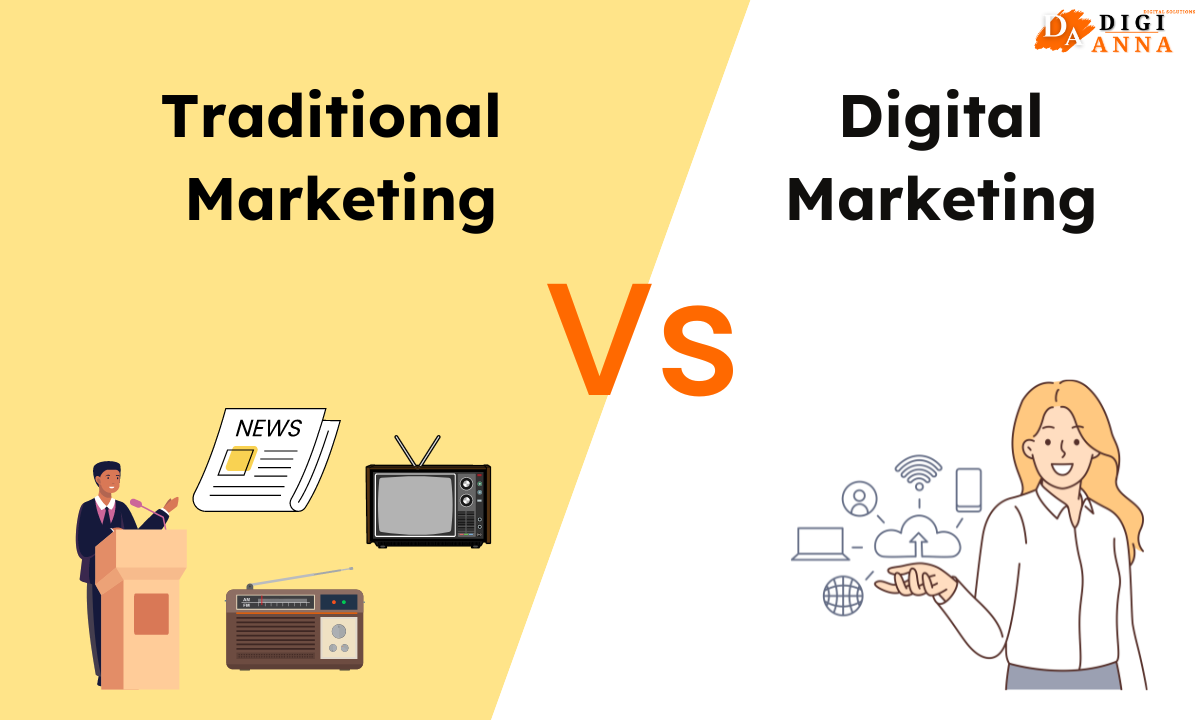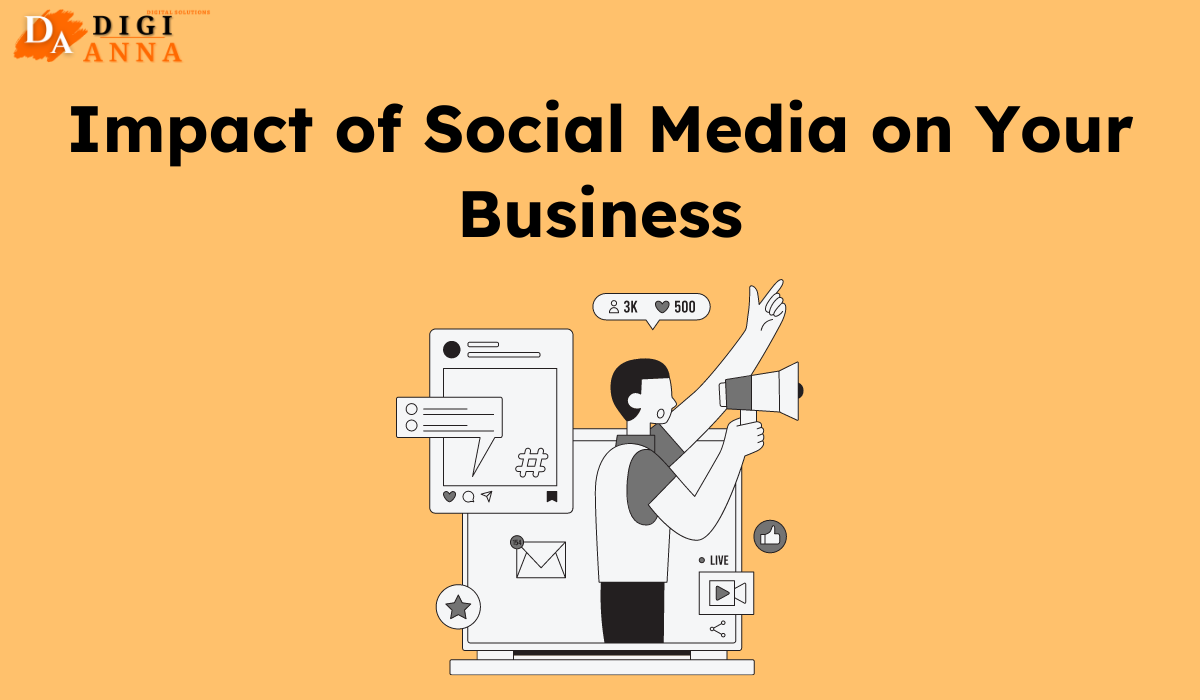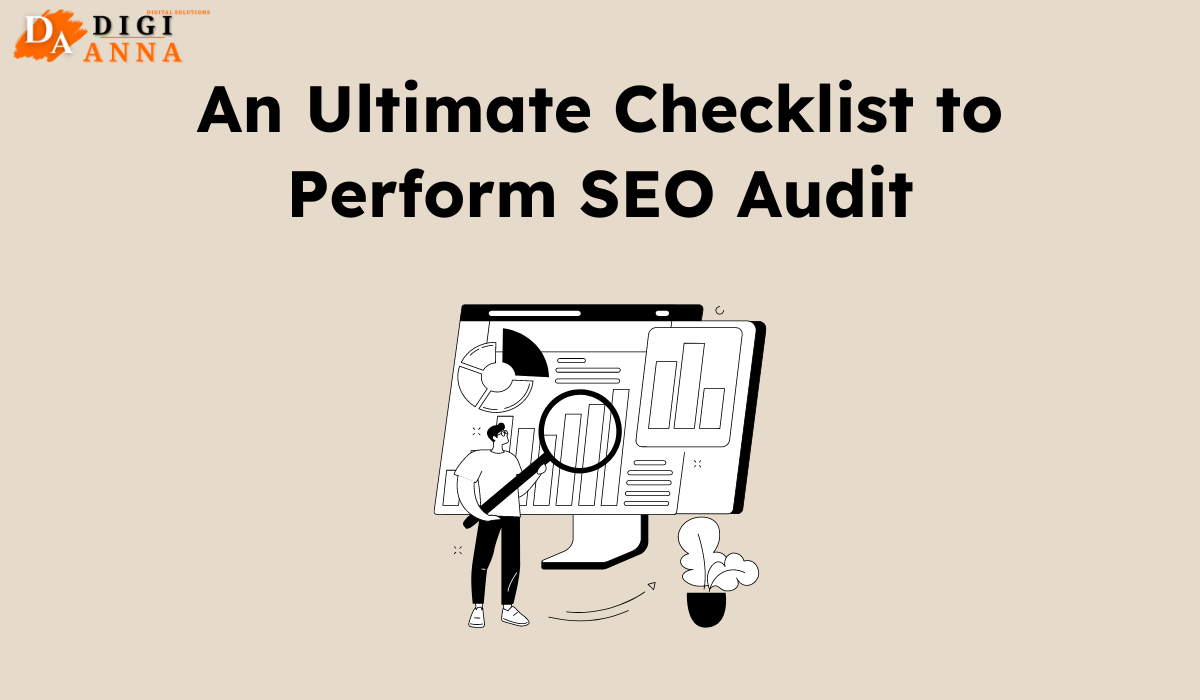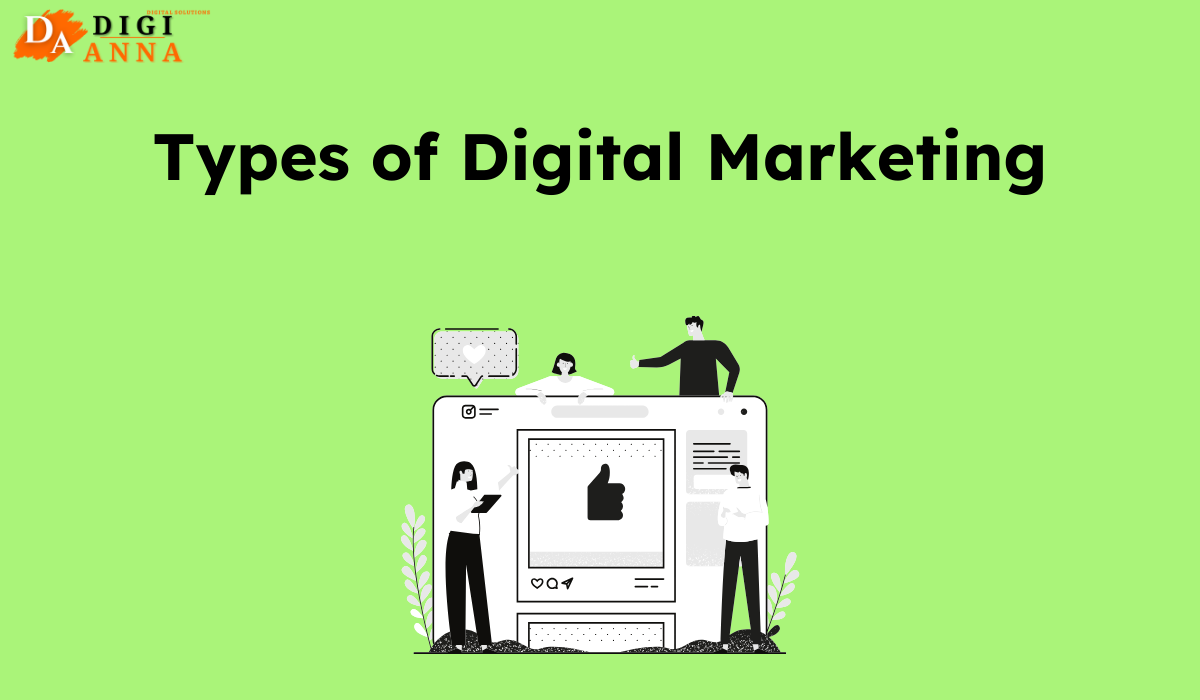Promoting products or services to attract customers is marketing. Two primary methods exist for this: traditional marketing and digital marketing. Traditional marketing has existed for a long time, whereas digital marketing is more modern. So, what distinguishes them? In this blog, we’ll explore traditional marketing vs digital marketing, discussing their pros and cons. By the end, you’ll better understand which approach may suit your business.
What is Traditional Marketing?
Traditional marketing is promoting products or services without digital platforms. It’s the old-school way of reaching out to potential customers without the use of digital technology. Traditional marketing relies on traditional media outlets such as,
- Print Advertisements
- TV Commercials
- Radio Broadcasts
- Direct Mail
- In-Person Events
These traditional methods have been widely used to reach target audiences and create brand awareness for decades before the rise of digital marketing. For instance, think about a television commercial advertising a new car model. This is a classic example of traditional marketing. The ad is broadcast to a wide audience during commercial breaks, aiming to capture viewers’ attention and persuade them to consider purchasing the car.
Moreover, traditional marketing also encompasses print advertisements found in newspapers and magazines. These ads are placed strategically to target specific demographics based on readership. For example, Consider a full-page ad in a fashion magazine promoting a luxury skincare brand. This advertisement is designed to attract readers interested in skincare products and luxury lifestyles.
Additionally, traditional marketing includes radio commercials, which are broadcast to listeners during breaks between songs or programs. These ads aim to engage listeners and encourage them to take action, such as visiting a store or website. Furthermore, Think about a local restaurant promoting a special offer through a radio commercial. The advertisement encourages listeners to visit the restaurant to enjoy a discounted meal, enticing them with the offer.
Pros and Cons of Traditional Marketing
Traditional marketing methods have both advantages and disadvantages. First, let’s explore the pros, then we’ll tackle the cons.
Pros:
- Widespread Reach: Traditional marketing methods, such as TV and radio advertisements, enable businesses to reach a broad audience, increasing brand visibility.
- Tangible Presence: Physical marketing materials like brochures and posters provide a tangible presence, leaving a lasting impression on potential customers.
- Local Targeting: For businesses catering to a specific locality, traditional marketing proves effective in reaching the local community. Local newspapers, radio stations, and community events provide opportunities to connect with the target audience on a personal level, fostering a sense of community involvement.
- Established Trust and Credibility: Establishing trust is paramount for any business. Traditional marketing techniques, such as physical brochures, direct mail, and TV commercials, contribute to building credibility. Tangible materials and familiar formats often resonate well with consumers, instilling a sense of reliability.
- Familiarity: Many consumers are accustomed to traditional marketing tactics, making them easier to understand.
Cons:
- Costly Investments: Traditional marketing campaigns, like television commercials, can be expensive, limiting smaller businesses with tighter budgets.
- Limited Interactivity: Compared to digital marketing, traditional methods offer less interaction and engagement with the audience.
- Difficulty in Tracking ROI: Measuring the return on investment (ROI) for traditional marketing efforts can be complex, hindering the ability to analyze campaign effectiveness.
- Inability to Target Specific Demographics: Traditional methods may not provide as precise demographic targeting as digital alternatives, potentially leading to a less efficient use of resources.
- Less Flexibility: Once a traditional ad is printed or aired, it’s difficult to make changes or updates.
What is Digital Marketing?
Digital marketing is the promotion of products or services using electronic devices and the internet. Such as,
- Website Optimization
- Social Media Presence
- Search Engine Optimization (SEO)
- Content Marketing
- Email Marketing
Imagine you run a small bakery and wish to expand your customer base. Instead of sticking to traditional advertising methods such as flyers or newspaper ads, you opt for digital marketing strategies.
To begin, you establish a website for your bakery, enabling customers to explore your products and place orders online. Subsequently, you leverage social media platforms like Facebook and Instagram to exhibit your mouthwatering treats, interact with customers, and offer exclusive promotions.
Simultaneously, you initiate an email newsletter to keep subscribers informed about new menu additions, special offers, and upcoming events at your bakery. Additionally, you employ search engine optimization (SEO) techniques to ensure that when individuals search for the “best bakery near me,” your bakery’s website emerges at the forefront of search results.
Moreover, you execute targeted online advertisements on platforms like Google or Facebook, targeting potential customers based on their preferences, demographics, and online activities. Consequently, your digital marketing endeavours contribute to attracting more foot traffic to your bakery, boosting online orders, and ultimately fostering the growth of your business.
Pros and Cons of Digital Marketing
Pros:
- Cost-Effective: Digital marketing can be more affordable compared to traditional methods like print or TV ads.
- Targeted Advertising: With digital marketing, businesses can target specific demographics, interests, and behaviors of their audience.
- Measurable Results: With digital tools, you can track and measure the performance of your marketing efforts in real time, allowing you to adjust strategies for better outcomes.
- Global Reach: The Internet has a vast reach, enabling businesses to connect with potential customers worldwide.
- Engagement Opportunities: Through social media and email marketing, you can interact directly with your audience. Digital platforms foster two-way communication, enabling feedback and dialogue. Hence, you build stronger relationships and customer loyalty.
Cons:
- High Competition: With more businesses going digital, competition for online visibility and customer attention is intense.
- Technical Skills Required: Digital marketing requires understanding and navigating through various tools, platforms, and algorithms, which can be overwhelming for beginners.
- Constant Adaptation: Digital marketing trends and technologies evolve rapidly, necessitating continuous learning and adaptation to stay competitive.
- Potential for Information Overload: With the abundance of digital content, consumers may experience information overload, making it challenging for businesses to stand out.
- Security Risks: Digital marketing exposes businesses to cybersecurity threats such as data breaches and phishing scams.
How Traditional Marketing is Different from Digital Marketing?
In today’s world, businesses have numerous marketing options to promote themselves. Understanding the differences between digital marketing vs traditional marketing is crucial to choosing the most effective strategies for your business. Now, let’s explore the variances between these two approaches to help you make informed decisions.
Difference Between Traditional Marketing and Digital Marketing
| Aspect | Traditional Marketing | Digital Marketing |
| Reach | Reach is limited to local or regional areas. | Can reach a global audience instantly. |
| Cost | It can be expensive, especially for TV or print ads. | Generally more cost-effective. |
| Targeting | Targeting is less precise, with a broader audience reach. | Highly targeted, can reach specific demographics. |
| Measurability | ROI measurement can be challenging. | Provides detailed metrics for tracking ROI. |
| Flexibility | Less flexible, changes may take time and effort to implement | Highly flexible, it allows real-time adjustments to campaigns. |
| Longevity | Ads have a short lifespan and need constant renewal. | Content can have a longer lifespan online. |
| Interactivity | Limited interaction is usually a one-way communication. | Engages directly with the audience, offering chances for interaction. |
| Speed of Results | Slower results: campaigns may take time to gain traction | Quick results with the potential for instant engagement |
| Customer Feedback | Limited feedback often relies on customer surveys or market research. | Immediate feedback through comments, likes, shares, etc. |
| Branding Opportunities | Branding opportunities are limited to the chosen medium’s format, such as print or TV ads. | Offers various opportunities for branding through social media presence, content marketing, influencer partnerships, etc. |
| Time to market | Requires more time for planning and execution. | Campaigns can be launched quickly |
| Long-term sustainability | Depends heavily on continuous investment in advertising. | Offers long-term sustainability through evergreen content, and SEO |
| Analytics and Metrics | Limited analytics often rely on estimations and surveys to measure effectiveness. | Extensive analytics and metrics are available to track performance and ROI, allowing for real-time adjustments. |
| Examples | TV ads, radio ads, print ads, billboards. | Social media marketing, email marketing, and SEO. |
Traditional Marketing vs Digital Marketing: Which is Best for Your Business?
Are you trying to decide between traditional marketing vs digital marketing? The best choice for your business depends on various factors. Assess your needs carefully to determine whether digital or traditional marketing strategies will be most effective in reaching your objectives.
How to Decide Which One is Required for Your Business?
Understand Your Audience
Analyze who your target audience is and where they spend their time.
Cost Consideration
Assess your budget and determine which marketing method aligns better with your financial resources.
Trackable Results
Digital marketing offers tools to track and measure the effectiveness of your campaigns in real time, while traditional marketing might not provide such detailed insights.
Adaptability
Digital marketing allows for quick adjustments and optimizations based on data analysis, whereas traditional marketing strategies often require a longer lead time for changes.
Reach and Exposure
Digital marketing can potentially reach a broader audience globally, while traditional marketing may be more effective in reaching local or niche markets.
Industry Trends
Stay updated on industry trends and consumer preferences to identify which marketing channels are most effective for reaching your target audience.
Integration Possibilities
Consider integrating digital and traditional marketing strategies for a comprehensive approach that leverages the strengths of both.
Industry and Business Type
Evaluate your industry and business type to see which marketing approach is more commonly used and effective.
Competitor Analysis
Look into what your competitors are doing in terms of marketing and assess the effectiveness of their strategies.
Experimentation and Testing
Test different marketing channels and strategies to determine which ones resonate best with your audience and deliver the highest ROI.
Conclusion
Traditional marketing and digital marketing differ, each with unique strengths. Traditional methods provide a personal touch and physical presence, whereas digital strategies enable global reach and precise targeting. Combining both approaches produces optimal results. Therefore, businesses should adopt a hybrid marketing approach for competitiveness in the dynamic landscape. Integrating traditional and digital techniques helps engage diverse audiences effectively, achieving marketing goals seamlessly. This hybrid strategy ensures a well-rounded marketing approach, enhancing overall success.

